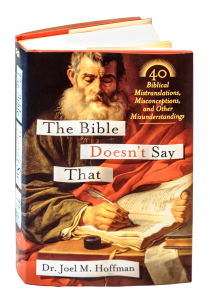“The Bible Doesn’t Say That” Goes On-Sale Today!
 My latest book — The Bible Doesn’t Say That: 40 Biblical Mistranslations, Misconceptions, and Other Misunderstandings — goes on sale today!
My latest book — The Bible Doesn’t Say That: 40 Biblical Mistranslations, Misconceptions, and Other Misunderstandings — goes on sale today!
Here’s the cover copy:
The Bible Doesn’t Say That explores what the Bible meant before it was misinterpreted over the past 2,000 years.
Acclaimed translator and biblical scholar Dr. Joel M. Hoffman walks the reader through dozens of mistranslations, misconceptions, and other misunderstandings about the Bible. In forty short, straightforward chapters, he covers morality, life-style, theology, and biblical imagery, including:
• The Bible doesn’t call homosexuality a sin, and it doesn’t advocate for the one-man-one-woman model of the family that has been dubbed “biblical.”
• The Bible’s famous “beat their swords into plowshares” is matched by the militaristic, “beat your plowshares into swords.”
• The often-cited New Testament quotation “God so loved the world” is a mistranslation, as are the titles “Son of Man” and “Son of God.”
• The Ten Commandments don’t prohibit killing or coveting.
What does the Bible say about violence? About the Rapture? About keeping kosher? About marriage and divorce? Hoffman provides answers to all of these and more, succinctly explaining how so many pivotal biblical answers came to be misunderstood.
The table of contents is on-line here, and you can learn more about the book here. Publishers Weekly has a pre-review here.
I’m excited about this latest work, and look forward to discussing it here.




Dr. Hoffmann, digging deeper on the translation of “chamad” I referenced Philo, On The Decalogue, 142 and unexpectedly found Philo using “covet” rather than “take.” How far back, or what early writings can I obtain to discover antiquity’s actual meaning of “chamad?”